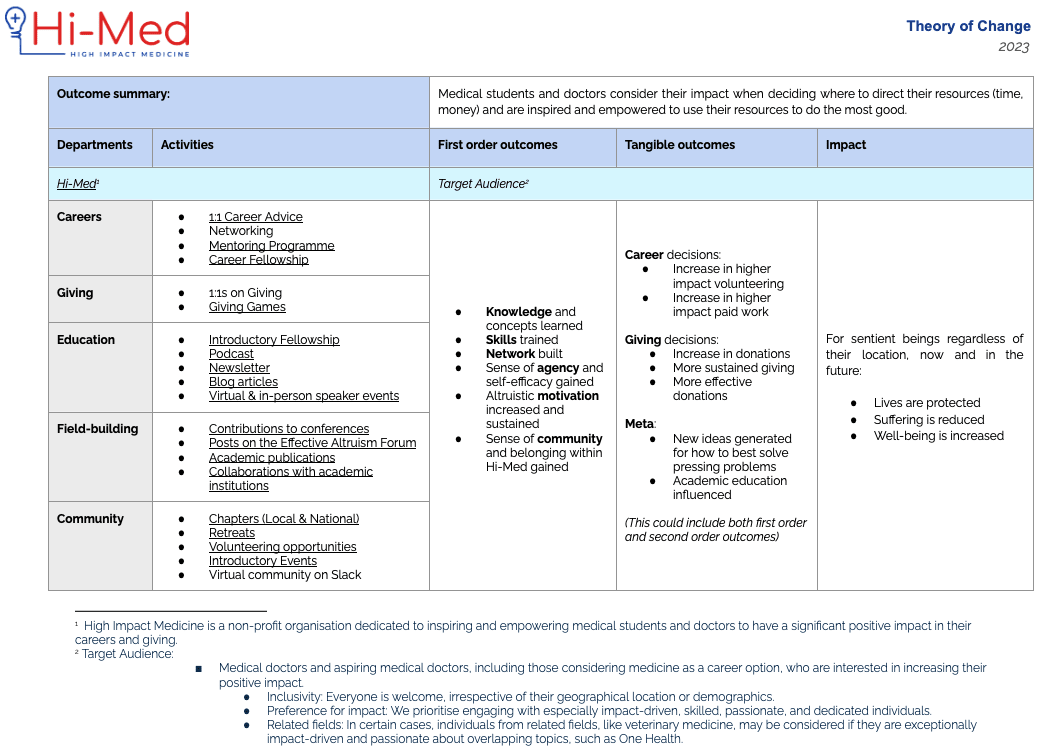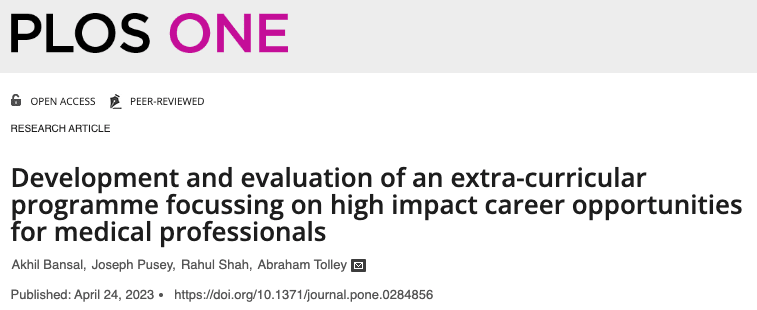Introduction
As part of the Marginal Funding Week, we want to give a brief update on High Impact Medicine, describing which projects marginal funding is likely to be spent on.
High Impact Medicine (Hi-Med) is a non-profit organisation dedicated to inspiring and empowering medical students and doctors to make impact-driven decisions in their careers and giving.
Theory of Change

This is an overview of our activities, our current definition of positive impact, our target audience and the outcomes we monitor.
The main assumptions behind our theory of change are:
- Target group-specific interventions can improve altruistic behaviour change beyond broad outreach: Interventions customised to professional groups account for background-specific needs, abilities, and goals.
- Professional peers can be potent facilitators of altruistic behaviour: Role models are an important trigger for altruistic behaviour change. Change is more likely when someone is “like me”, i.e. belongs to a relevant peer group.
- Medical doctors are a well-suited target group for altruistic impact considerations: They are often strongly altruistically motivated, exceptionally skilled, and scientifically minded, and they often have significant career capital and high incomes.
Proof of concept: Past interventions and their validation
We conducted various programmes, interacting with > 500 medical doctors and students over the past two years. The full 2023 Impact Survey Executive Summary can be found here. The evaluation of our inaugural introductory fellowship cohort has been published in an academic peer-reviewed journal.

Bioethicist Benjamin Krohmal recently ran an elective course for medical students at Georgetown University School of Medicine in the US, "Beneficence & Beyond: How to do the most good with your medical career", that was inspired and informed by our introductory fellowship. Our monitoring and evaluation team is currently helping to assess the results, and we are in conversations with other universities to run similar programmes.
What we learned
- There is substantial interest in the medical community to learn more about doing the most good: We also got preliminary confirmation that the medical background of the High Impact Medicine team meant that we were able to form genuine and meaningful connections with our members, which in turn increased the tractability of our efforts.
- It’s likely that a mix of interventions that matters: All individuals for whom Hi-Med has facilitated career changes have participated in both the introductory fellowship and 1:1 conversations. 1:1 conversations seemed to be particularly important in influencing them to make these career and giving decisions.
- We have seen the most positive impactful changes in individuals with high scores in altruistic motivation & career capital: This was an observation from our most successful case studies.
- Time investments to attain giving pledges can be extremely low: Charismatic individuals can initiate someone strongly considering a donation pledge in a single 1-1.
- Impact attribution is challenging: Individuals engage in multiple interventions, complicating evaluations.
- Reliance on volunteers is unsustainable: Operationally, our rapid community growth and reliance on contractors / volunteers strained our organisational capacity.
Looking forward
Based on our evaluation of past and current programmes, we plan to iterate in the following way
- Select for and attract more promising individuals (e.g. by building external credibility) and provide them with timely and individualised support (e.g. more 1:1 calls, a career fellowship cohort starting every other month, biosecurity career change accelerator programme).
- Continue to iterate, evaluate and scale up our most impactful programmes, especially our introductory fellowship, career fellowship, 1-1 and peer mentoring. As we iterate on these programmes, we plan to test new and promising approaches as well.
- Scale up giving efforts from 20% to 30% of total org resources (e.g. by deliberate outreach during events and weekend-long giving games).
- Collect better data across our full range of programmes so that we can further our understanding of which of our specific programmes are the most impactful.
- Transition from volunteer-based work to hiring a (full-time) employee programme manager / operations professional should funding allow.
Testimonials from our intro and career fellowship surveys (sample)
- "Brought together many EA concepts. Connected me with likeminded people. Most importantly, has got me connected with a highly effective charity that I am now volunteering for. I don't think I would have had this opportunity otherwise."
- “I've already started a google sheet to write down different job opportunities, rank them according to the HI-Med Career Planning Tool, reach out to people working in the field to clarify/verify uncertainties or get a more accurate picture of the actual job and finally send applications.”
- “The fellowship is a great opportunity to think about one's career, and for me, it was really motivating and was a great kickstart to the whole process again.”
- “It really made me realise what a "high impact career" in medicine looks like. Before the fellowship, I had never really thought about choosing a high impact career and just imagined myself working on the wards as a "typical doctor".
- “The fellowship has shifted my way of thinking massively and what I want to achieve in my career. My desire to pursue a high-impact career in medicine is my top priority, e.g. working in public health.”
- “I hadn't really considered what makes a job high-impact before now, and likely would not have done so at all during my career had it not been for HiMed. I'm now more aware of how to create a bigger impact, as well as how to effectively donate money to do so.“
- “Through my facilitator, I was able to find out about opportunities/examples of people pursuing non-traditional career paths. I found this especially good because in medical studies, it is often difficult to find others who are not interested in a purely clinical path.”
- “I discovered so many ways I want to invest my time and energy in high-impact cause areas in the future. It gave me hope about how I still can make a difference.“
Thank you
Thank you for your interest in our work. And thanks to all our donors and volunteers, without whom we would have achieved nothing. If you're interested in volunteering, you can see our current opportunities here. If you would like to support our work financially, you can do so here.
(High Impact Medicine Limited is a limited-liability company operating as High Impact Medicine, a project of Players Philanthropy Fund, a Maryland charitable trust recognized by IRS as a tax-exempt public charity under Section 501(c)(3) of the Internal Revenue Code (Federal Tax ID: 27-6601178). Contributions to High Impact Medicine are tax-deductible to the fullest extent of the law.)

Executive summary: High Impact Medicine is a non-profit seeking to inspire medical students and doctors to make impact-driven career and giving decisions. Their programs have shown promise in shifting mindsets, facilitating career changes, and inspiring donations.
Key points:
This comment was auto-generated by the EA Forum Team. Feel free to point out issues with this summary by replying to the comment, and contact us if you have feedback.